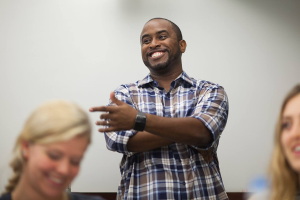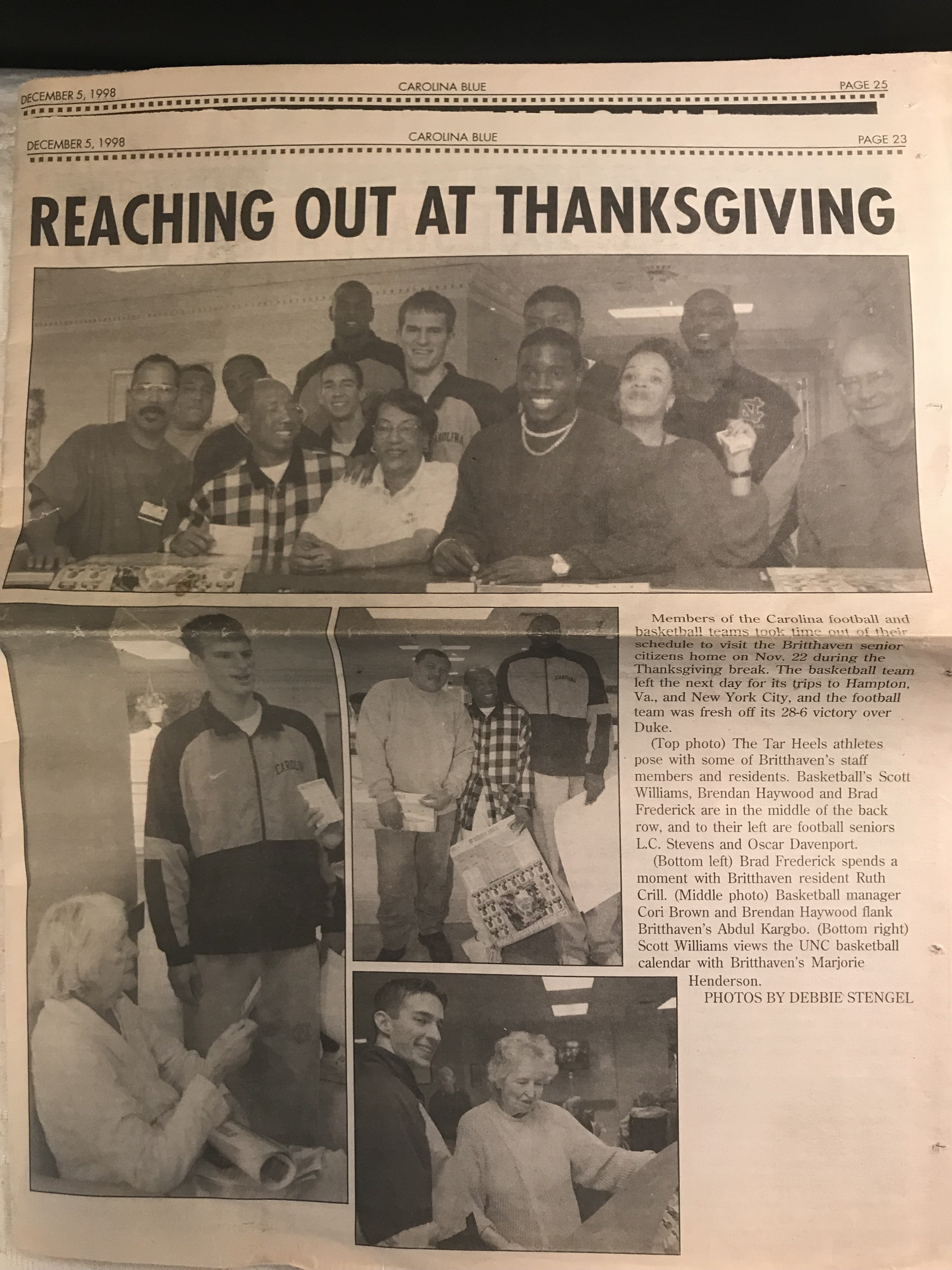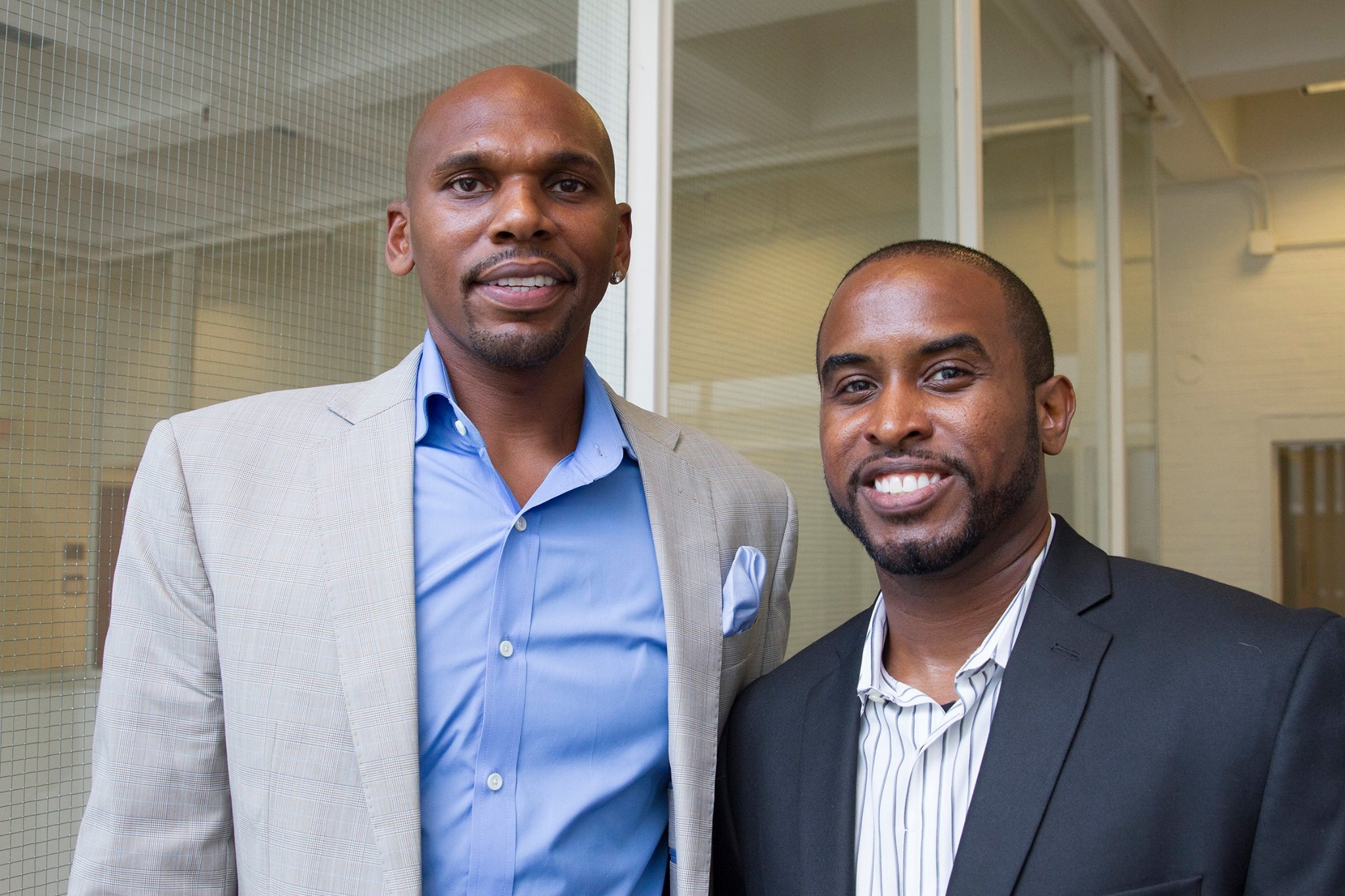More to Life: Faculty member Livis Freeman spreads community mission through Hussman School

Livis Freeman adjusted the video camera at the front of the classroom as his students rustled behind him. It had to be perfect.
“Everybody ready?”
It was 3:45 p.m., and the students had spent the night before preparing for this. At any moment, Freeman would call Danny Green — the former Tar Heel and current San Antonio Spurs guard — and their campaign would begin.
Green had agreed to be a client this semester for the students of “MEJO 634: Public Relations Campaigns.” He’d get a personalized public relations campaign from the students, and they’d get real-world experience with a high-profile client.
"It’s almost surreal,” said Becca Kronebusch ‘18, a senior in Freeman’s class. “It verifies our ability, and for him to trust us as students with that is really incredible."
During the call, the students would pepper him with questions about his interests, needs and ambitions — anything to better understand their client. Then, they’d develop a public relations campaign to deliver his message and serve his purpose.
“You might not want to ask him about his performance last night,” Freeman said, smiling. “Let’s lay off that.”
Green had gone 0-for-2 against the Sacramento Kings the night before, but his stats are secondary. He remembers volunteering in the Chapel Hill community in his time at UNC. And his annual North Carolina basketball camp hasn’t gotten the social traction he had hoped.
"I'm trying to get back in touch with my Carolina roots,” Green said.
That’s the mission for these students, with Freeman at the helm. The teaching assistant professor graduated from UNC in 1999, but he never went to the UNC Hussman School of Journalism and Media. Nevertheless, he’s distinctly qualified to guide these students on their public relations path.
After all, he’s been forging his own for years.
FINDING A PURPOSE
He was groomed to be a pharmacist.
That was the plan, at least. Freeman grew up in the small town of Clinton, North Carolina, where he says you’d go to the pharmacist before you’d go to the doctor. The plan changed when he got to Chapel Hill, where a week spent in an introductory chemistry course altered his path.
“Yeah,” he remembers saying, “I'm not gonna be a pharmacist.”
So he pivoted to psychology, a degree he felt would be versatile and afford him more free time than a medical track. And he used every minute.
As a junior, Freeman lived in Ehringhaus dorm, where he shared the halls with many UNC football players and hosted video game tournaments on his Sega Genesis.
He was friends with Cori Brown — a manager on the men’s basketball team — who was close with All-American forward Vince Carter. A friend of Freeman’s then-girlfriend was dating Antawn Jamison, the unanimous 1997-98 Player of the Year, and teammate Ademola Okulaja was friends with them all.
It was quite the crew — Freeman, Brown and three starters from UNC’s 1997-98 Final Four team — roaming about campus when they weren’t called to the Smith Center.
Freeman served as intermediary in rivalries between football and basketball, making his room a space where all parties found common ground. When the players wouldn’t answer their phones, absorbed in a game of NBA Live, Freeman fielded calls until they were ready.
It was image management at its finest.
"I didn't realize it,” Freeman said, “but I was doing PR even back then."
Freeman went back home early in the first semester of his senior year to see his grandmother in a nursing home in Clinton. He saw another woman in a nearby room, her family never there to visit. He wished he could change that.
When he returned to campus, Freeman asked the athletes if they would ever want to visit a local nursing home. Maybe they could touch the lives of patients like the one in Clinton.

And they did. Freeman remembers bringing a dozen UNC standouts — including men’s basketball center Brendan Haywood, quarterback Oscar Davenport and receiver L.C. Stevens — to a nursing home in Chapel Hill around Thanksgiving.
The players were heroes in that building, and they loved the visit nearly as much as the patients. When they left, the players asked Freeman when they could do it again.
With that, Freeman chartered the UNC organization “Athletes Making a Difference,” and he organized player visits to the Ronald McDonald House, the Inter-Faith Council for Social Service Community House (IFC) and more. He even sorted through fan mail at the men’s basketball office and sent responses to kids across the state.
It all started with that day at the nursing home, a memory still vivid in Freeman’s mind. He remembers standing afterward in the parking lot, too, knowing his fundamental mission had changed.
“I don't know what I just did,” Freeman thought, “but I want to figure out a way to do it for the rest of my life.”
STARTING FROM SCRATCH
Freeman sat in the aisles of Barnes & Noble, the “For Dummies” series serving as his newest mentor. He needed to start a business, but he didn’t know where to start. Just two years post-graduation, he had a handful of interested clients and a wealth of valuable content. Now what?
It started in 1998, when Carter and Jamison — both top-five picks — declared early for the NBA Draft. Freeman and Brown had dreams of starting their own sports agency, so they put on their finest suits and shadowed the two players at “Agent Day,” a day on which agents were allowed interact with prospective draft picks on campus in a closely controlled and monitored environment.
Carter’s agent, William “Tank” Black, offered Freeman a position with his agency, but Freeman had reservations and instead opted for Octagon, then a budding marketing firm with a growing sports clientele.
Years later, Black was convicted of scamming millions of dollars from his clients. Forbes reports Octagon is now one of the five most valuable sports agencies in the world.
It didn’t pay well then, but it taught Freeman about the industry. And it wasn’t long before he’d put that knowledge to use.
In 2000, while in Los Angeles on Octagon business, he had a lunch meeting with Arn Tellem, one of the most famed sports agents in the industry. Tellem told Freeman about Athlete Direct, a sports company that managed personalized websites and digital brands for top professional athletes.
Later that afternoon, Athlete Direct offered him a position in athlete relations. All he’d need to do was call three dozen athletes once a week, relay 10 questions from fans and then post the answers on their personal websites. He just had to sign the dotted line.
“It was like a dream,” Freeman said.
It wouldn’t last. The company’s business model — built on owning the rights to players’ signatures and postgame thoughts — wasn’t sustainable when athletes starting giving both away for free. In 2001, the site was set to be erased, so Freeman preserved exclusive content at his clients’ request: photos, videos, anything he could save before everything went under.
“Get whatever you can,” they told him. “If you start your own company, we’ll be your clients.”
He had clients. Now, he needed a company.
So he searched the shelves for tips on starting a public relations company with a focus on community relations. After Athlete Direct went under, he founded 4ourFans, Inc., which helps athletes create charitable identities and give back to their communities and fans.
His first client was Jerry Stackhouse, a former Tar Heel who led the NBA in points scored the previous season, in 2000-01. But before he’d sign, the All-Star needed a business plan approved by his financial advisers.
“I didn’t even know what a business plan was,” Freeman said.
He returned to Barnes & Noble, “For Dummies” as his guide, and inundated himself with research. He concocted the “More to Life” campaign — there’s more to life than the riches you enjoy, he says, like giving back to your community and connecting with your roots — and devised ways to help Stackhouse enrich his hometown of Kinston, North Carolina. They’d visit local schools, granting awards for academic progress and organizing holiday projects.
He proposed his plan to Stackhouse’s financial advisers. They lauded it and gave him $5,000 to get started.
His mission had begun.
In October 2001, Stackhouse became the first winner of the NBA Cares Community Assist Award, recognizing philanthropy and charitable work from players. In May 2003, he became the first two-time winner. Players took notice.
Jamison called up his old friend and expressed interest in signing with 4ourFans, Inc. Juwan Howard, the first NBA player to sign a $100 million contract, wanted aboard, too. Freeman’s fledgling business already had three stars while still in its formative stages.
"At the time, I didn't realize how fortunate I was,” he said.
Over the next 17 years, Freeman would work with more than 60 clients across the NFL, NBA, PGA and even boxing — launching personal websites and spearheading community campaigns.
He had turned his mission into a reality. Eventually, it was his turn to help others do the same.
GIVING BACK TO HIS ROOTS
The students never saw it coming.
It was the first day of classes, Freeman’s first since his undergraduate days, and the new faculty member had a surprise planned. Given his relationships with so many Tar Heel legends, expectations were high for his first course behind the podium. He couldn’t disappoint.
When the students filed in, he told them he’d be starting his teaching career with a real-world example involving his first client.
"Come up with questions for Stackhouse,” he said, “and I'll roleplay him."
It was an unorthodox start to his career as a teacher, but he had never planned to become one, anyway. He had visited UNC as a guest lecturer on occasion, at the request of the Carolina Public Relations Student Society of America (PRSSA), but he never thought he would become a mainstay.
During his classroom visits, he’d always have a line of students asking about potential career opportunities. To answer, he started an internship program, which has since given 50 students experience in public relations.
"Whenever I see people, I just imagine myself in their shoes,” Freeman said. “I would have loved to have a company like mine to intern for."
Before long, he realized he could have the same impact teaching.
In 2014, with his personal workload slowing down, he called Dean Susan King and asked about joining the faculty. And so he embarked on his next mission, doggedly preparing to teach public relations courses at one of the top programs in the nation.
And on that first day — his students still conjuring up questions for the hypothetical NBA star — Freeman had a surprise.
 “You know what, I’ve got a better idea,” he told them. “Why don’t you ask him yourselves?”
“You know what, I’ve got a better idea,” he told them. “Why don’t you ask him yourselves?”
That’s when Stackhouse, who had been waiting in the hallway, ducked under the door frame and stood before the class. A week later, unbeknownst to the students, Jamison would do the same thing.
“They were shocked,” Jamison said.
Freeman’s students were floored, and they fell in love with the course. Two years later, he became a full-time teacher at the school.
"Stuff like this you can't plan,” Freeman said, “at all.”
Moments like those embody Freeman’s approach as an educator. He has the real-world connections and experiences to complement his curriculum. His class is discussion-based, and he’s determined to keep students engaged. If his students read about it, he’s done it — and he uses his personal stories to make the material applicable for his students.
"He realizes that our time is valuable,” Kronebusch said, “and that we bring something to the table that even he can learn from."
Though she’s a political science and public relations double major without much interest in sports, Kronebusch said her friends insisted she take a class with Freeman before she graduated. She’s now taken two: “MEJO 531: Case Studies in Public Relations” and the current public relations campaigns course.
Since then, Kronebusch says Freeman has become a mentor — offering job advice, letters of recommendation and general counsel in whatever she needs, even though she doesn’t plan on following Freeman’s career path.
"He makes an effort to actively remember and become invested in what I care about and what my goals are,” Kronebusch said.
Freeman’s still getting accustomed to the intricacies of teaching. He jokes that he’s like the Indiana Jones of academia — splitting time between the classroom and the field. But his classes have already made an impact in the community.
Freeman’s students have helped organize a charity project for the NHL’s Nashville Predators. They’ve worked with animal shelters and the Ronald McDonald House. And they’ve helped TROSA — a Durham-based recovery program that helps rehabilitate substance abusers — address the language barrier of its thriving thrift store, one of the largest in the country.
And, of course, they’ve helped athletes such as Jamison and Green give back to their communities.
"I'm proud that he's using his platform and has been successful at it,” Jamison said. “He's got great connections, and people realize what he's doing is positive and is really benefiting this university."
Freeman turns almost giddy when he talks about these projects, just as he does when reliving that nursing home visit so many years ago. To the community relations veteran, using his career experiences to guide others is more rewarding than the experiences themselves.
"Before, I couldn't imagine ever teaching,” he said. “Now, I couldn't imagine not teaching. I love it that much."
It’s a boon for his students, just as it is for course clients such as Green, who can give back to their communities with the students’ support. Freeman has already found his purpose — now he’s helping others find theirs.
That’s his mission at work.
"He's definitely someone that you are lucky to know, lucky to interact with, and I want to fill my life with people more like him,” Kronebusch said. “He's the kind of professor that I would want to be."